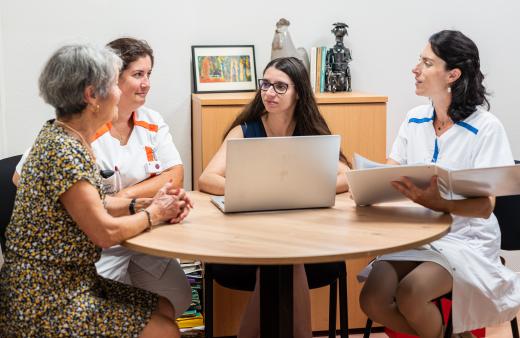Family carers, a key role in supporting people with Alzheimer’s disease

Talking about Alzheimer’s disease also means talking about those who, in a non-professional capacity, support and care for their loved ones who are suffering from a loss of autonomy. The carer is often from the patient's family, whether it is a spouse, a sibling, a child or those around them. Being a family carer involves responsibilities and a significant emotional investment. While this daily commitment is often heavy to bear, discover how the Clariane community supports family carers and integrates them into their loved one's care pathway through its care homes (Korian, Seniors, etc.).
The family carer, a major support in the daily life of the patient
Alzheimer’s and related diseases are complex diseases, both for the patient and for those around them, and require special attention and care.
The role of the family carer is decisive, through the multiple forms of support they provide (emotional, material, financial, legal, etc.) and their presence with the patient is essential.
While people often become carers unintentionally, without even knowing it sometimes, and almost always without being prepared for it, it is normal to feel alone and helpless in the face of trying situations. At Clariane, our teams work alongside carers to help them look after their loved one, as well as themselves, with complete peace of mind.
Carers in key figures
• More than 2 million family carers provide support to a person with Alzheimer’s disease in France (source: Alzheimer Europe).
• Nearly one in two carers (47%) report at least one negative impact on their physical or psychological health as a result of caring for a senior (DREES Social Report, France, 2019)
Clariane’s commitments to family carers
As a purpose-driven company whose mission statement is “To take care of each person’s humanity in times of vulnerability”, the Group’s first responsibility is to ensure excellence of care, while assuring dignity and freedom of choice for care-seekers and their families and strengthening or maintaining autonomy.
This is achieved through, which is built around the person and their needs, and respects their expectations. This is the meaning of our Positive Care approach that we are deploying in all of our facilities. This approach to care embodies our consideration for residents and their loved ones, whom we guide towards the most appropriate care solution.

Getting to know the family carer better to define their expectations and needs
Our care homes are shared living spaces, where we support residents and their family carers in the most personalised way possible.
Each family has different expectations in terms of the level of information they would like to receive, how they would like to be communicated with, and topics key to them, but also everything to do with the relationship they had with their loved one before they arrived, their family history or their state of health.
This is why Clariane’s teams recommend that family carers:
- Arrange an interview with the facility director or a member of the management team in the days following the resident’s arrival. This interview is an opportunity to answer any questions, but also to reassure and relieve the carer during this transition phase between home and the care home. It is also an opportunity to ask them how they would like to be kept informed, and how often, about their loved one and news from the facility.
- Share the resident’s personalised therapeutic plan.
- Participate in the life of the Group’s homes and take part in activities such as social and cultural entertainment, organised workshops, events, festive occasions or outings, etc.
Supporting the family carer
When a person with Alzheimer’s disease arrives at a facility, the family carer has already been looking after them for a long time. If they are to be able to continue supporting their frail relative, it is important that they take care of themselves. This means maintaining a social life, talking to people they trust, but also becoming aware of their own needs and limitations.
The Clariane teams are always ready to listen to the carer, and if they wish so, they can offer them the opportunity to take part in discussion groups or put them in touch with carers’ associations.
Focusing on therapeutic alliance
Family carers know their loved one very well and, as such, they have an important place in our homes. Together, we can provide the best possible support for their loved one. The relationship between the carer and their loved one has been built over time and continues in a different way within the facility. Thanks to the carers, the teams will be able to familiarise themselves with their loved one’s tastes, preferences, previous lifestyle habits and history. This invaluable information helps us to better understand the needs of residents and to adapt our support.
This is why cooperation between teams and the residents’ relatives is essential.
This is known as the therapeutic alliance. Caregivers and family members are involved in the care provided for the resident, respecting their lifestyle and wishes as far as possible.


